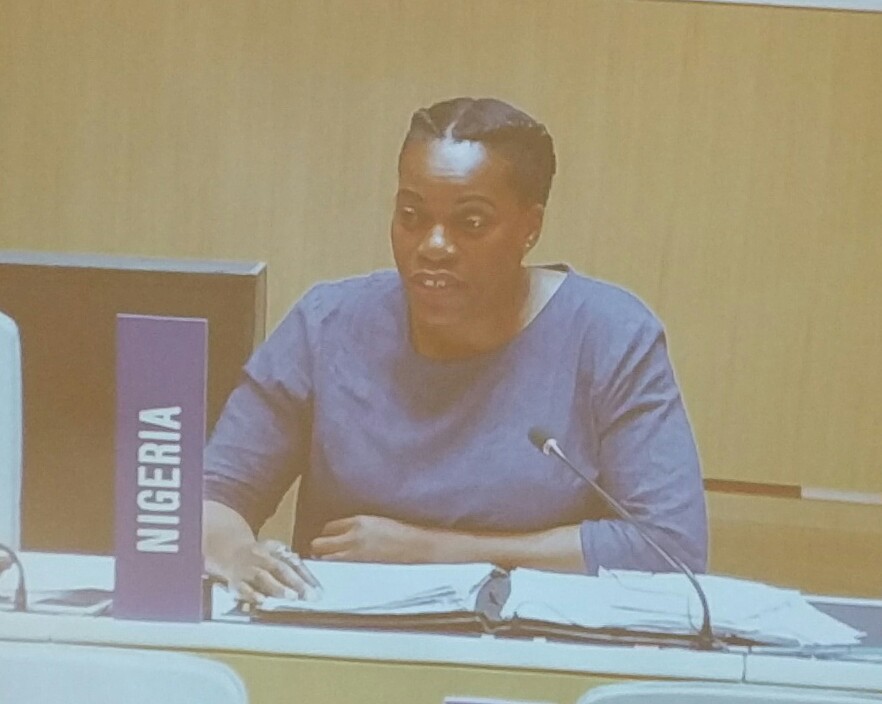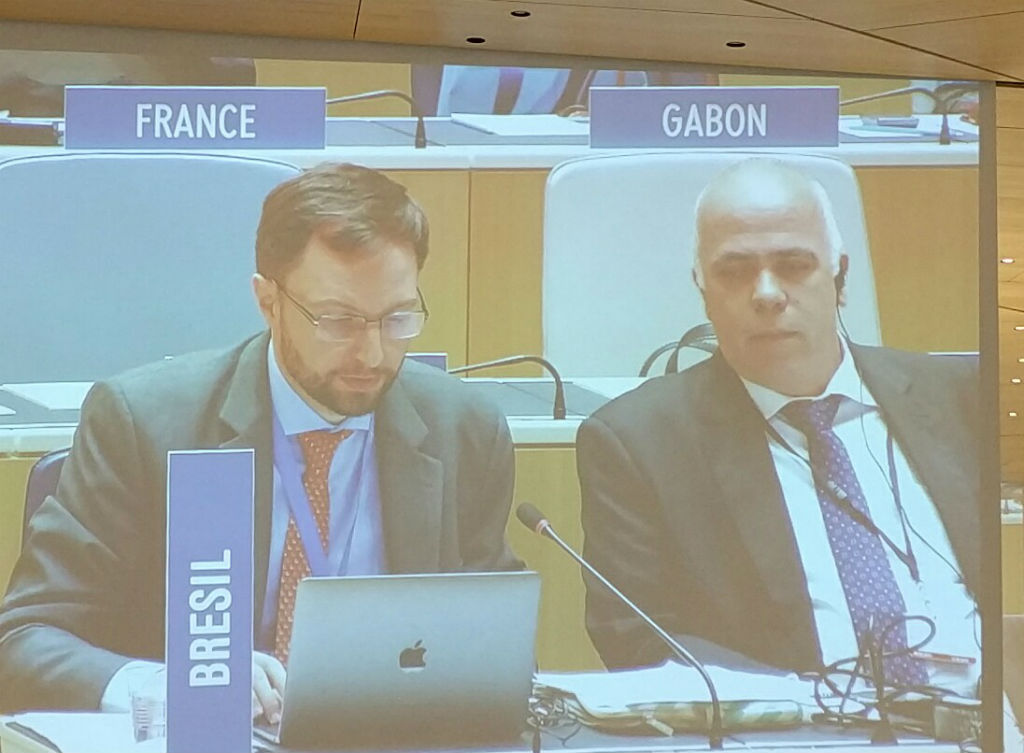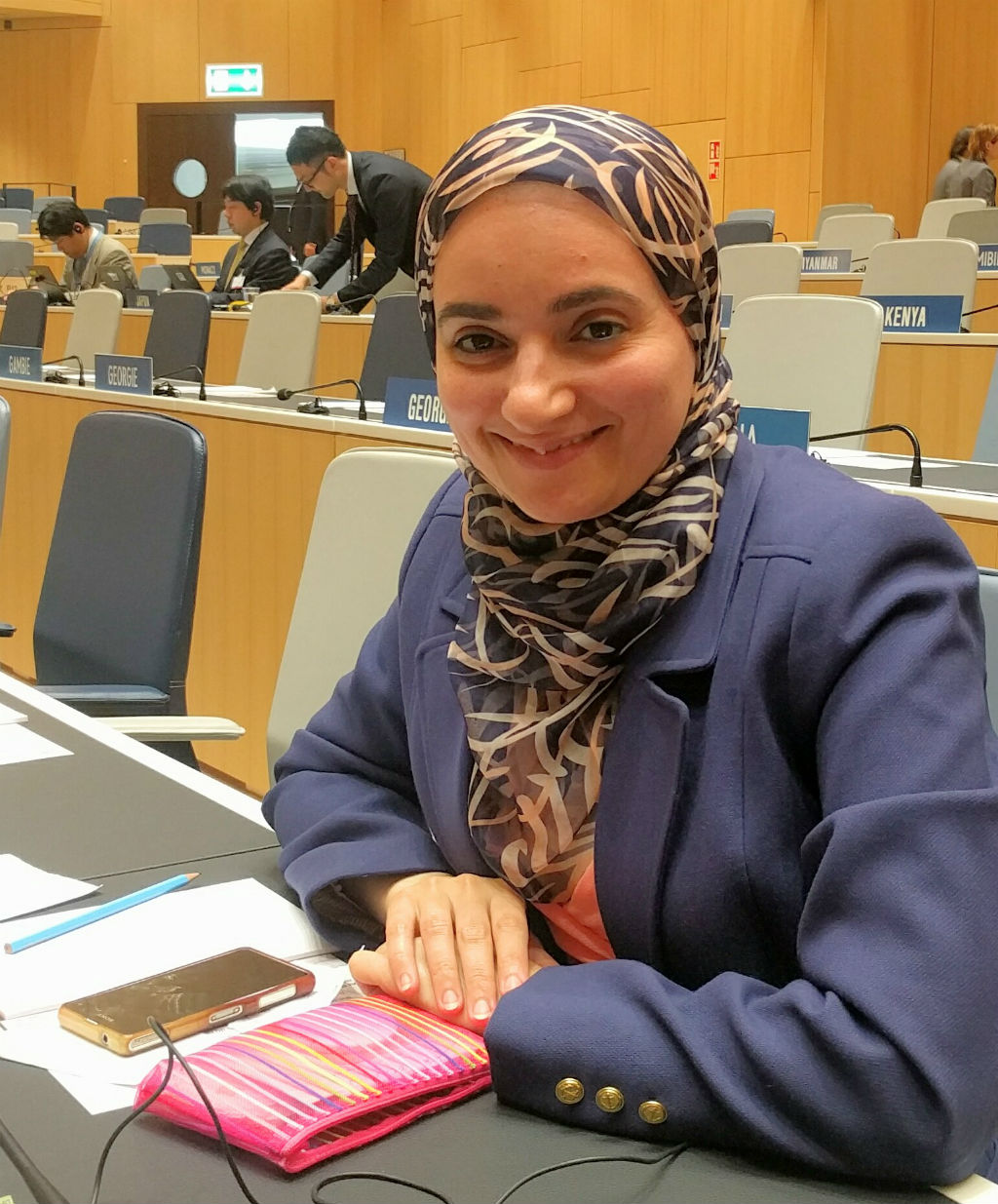Chair: And I will first invite Nigeria, on behalf of the African Group, to briefly introduce this Agenda Item. Nigeria has the floor. 
>> NIGERIA: Thank you, Mr. Chairman. I’m speaking on behalf of the Africa Group and we’re pleased to have the committee turning its attention to considering implementation of the SCCR’s implementation or contribution to implementation of the Development Agenda recommendations. We note that in the past, the committee has provided such information and made reports to the General Assembly.And we hope that at the end of the discussion we have on this Agenda Item, the SCCR can make a report to the 2016 General Assembly on its contribution to implementation of the Development Agenda recommendations. For the Africa Group, we believe that — we note that the adoption of the Development Agenda recommendations in 2007 was an acknowledgment by WIPO of its role in facilitating development, socioeconomic development of its Member States especially developing and Least Developed Countries.
We also see that it was a critical and conscious step by the organisation to mainstream development in all WIPO activities.
Some of these recommendations, especially with reference to cluster B are essential for helping to foster an inclusive and balanced IP system. And that takes into account the different levels of development of WIPO Member States.
Mr. Chair, the Copyright system has immense contribution to make to socioeconomic development. And this is well documented. We also think that the SCCR has a very good record in this regard for activities they will have taken within the organisation. If I referenced the Beijing Treaty the Marrakech Treaty and those before the adoption of the recommended agenda. But those which have been reached after 2007 and that’s Beijing Treaty and the Marrakech Treaty and potentially a broadcasting treaty. So with these in view and the current, the change of tone on pace of development in the committee, especially with reference to exceptions and limitations for libraries and archives and educational and research institutions, the Africa Group has immense concern on the willingness or level of commitment, political will that has been demonstrated by Member States to advance on this subject, taking into account the important Rule of education and knowledge and access to information that plays for human and societal development. We also mentioned sustainable development goals which has a specific SDG 4 on education and providing life long opportunities for all to learn.
I would also draw the committee’s attention to Development Agenda recommendation 17, which says that in its activities, including WIPO, should take into account the flexibilities of Intellectual Property agreements especially those which are of interest to Developing Countries and LDCs. And also recommendation 22, which says that WIPO’s norm setting activities should be supportive of the development goals agreed within the United Nations system, including the minimum development goals which have been sub-seeded by the sustainable development goals.
So this is a call to Member States to demonstrate the agreements we’re able to reach within the wider framework of the United Nations system. I don’t see any member of this committee that was not a member of — that is not a member of the UN system that agreed to the adoption of the sustainable development goals. So we hope that the committee can turn a page and pay — show more graciousness and tolerance and inclusiveness in the dealing in our engagement on exceptions and limitations for libraries and archives and educational research institutions. With those, I hope the Africa Group has clearly expressed its view in the area of exceptions and limitations contribution of the SCCR to the acceptance of the development —
>> CHAIR: Thank you for the Africa Group for this presentation which relates to these important topic of the Development Agenda and which goals of course will guide us in our discussion specifically in this committee, as well.
Brazil has the floor.

>> BRAZIL: Thank you, Chair, for giving me the floor. I’d like to thank the African Group for presenting this, for suggesting the inclusion of the inclusion of this Agenda Item in this session. Our delegation would like to highlight as presented by the Africa Group the recommendation of 17 and 22. Recommendation 17 states that activities including nonsetting WIPO should take into account the flexibilities international Intellectual Property agreements especially those which are of interest to Developing Countries and Least Developed Countries.We understand discussions on broadcasting, exceptions and limitations to libraries and archives, exceptions and limitations to educational and research institutions and persons with other disabilities as well as discussions on the GRULAC proposal S. CCR/– 4. Management of digital environment are good examples of the implementation of this recommendation. Recommendation 22 for its part
states that WIPO norm setting activities should be supportive of the development goals agreed within the UN system including those contained in the by — since they have a set of common sustainable goals. In this context sustainable development goal 4 ensure inclusive and quality education and promote life long learning opportunities for all is of special importance. Specifically in regard to
discussions for exceptions and limitations for libraries and archives and exceptions and limitations for educational and research institutions and persons with other disabilities.We’d like to commend the activities of the WIPO Secretariat to address in its working documents for norm-setting activities in other activities issues such as potential flexibilities, exceptions and limitations in the possibility of additional special provisions for Developing Countries and LDCs as guided by recommendation 22, lines D and E. Thank you, Chair.
>> CHAIR: Thank you to the Distinguished Delegate from Brazil for emphasizing the need to take into account this framework of the Development Agenda.
Greece has the floor.
GREECE: Thank you, Chair. I take the floor on behalf of Group B. We take an additional item on the contribution of the SCCR to the implementation of the Development Agenda on an ad hoc basis. We would like to underline that the additional Agenda Item has not been on the agenda in the recent past, and the development activities in the field of Copyright are undertaken by WIPO
irrespective of the inclusion of this agenda I had em. That being said, Group B accepts on an ad hoc basis the request from the African Group.
Group B believes that the committees of WIPO, including SCCR, have to focus on substance in order to achieve the mandate of the committees. From this viewpoint, we would like to reiterate the development considerations form an integral part of the work of this committee. We believe that the overall discussion in this committee on the subject matters on the agenda contributes to development-related considerations while taking into account the various levels of development.I thank you, Mr. Chair.
>> CHAIR: Thank you very much to the Distinguished Delegate from Greece for emphasizing considering that development is part of the integral work of our committee, as well, with complimentary views she has shared with us.
Okay. Anymore requests from the floor regarding this interesting and important Agenda Item?

Egypt has the floor.
>> EGYPT: Thank you, Mr. Chairperson. My delegation aligns itself with the comments made by the Distinguished Delegate of Nigeria on behalf of the African Group. And we share the views that have also been voiced by Brazil.I don’t want to be redundant in this domain; but, however, we would like to emphasize that since the goal is the mainstreaming of the Development Agenda and the Development Agenda has cluster on normative activity, so when the committees discuss substantive work, they should take into consideration the development access and accelerate work in this domain or otherwise we will be defaulting on our commitments, global commitments as it relates to the sustainable development goals, commitments related to Human Rights, if I may say since lots of the issues that we are discussing here are cross-cutting with some Human Rights issues. For example, education is not only sustainable development goal but it is a basic right. So as it relates to our area of discussion in this committee. So
accelerated work on the normative acrespect in addition to activities undertaken by WIPO and that are also under close observation by Member States of whether they are in line with the Development Agenda recommendations are hand-in-hand complimentary but they are not mutually exclusive. Thank you.